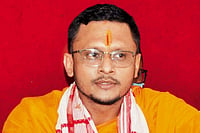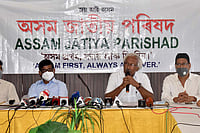It’s a striking photograph, of a young man mobbed by a group of children, some of them crying, others hugging him, apparently to stop their favourite teacher from leaving. If a picture is worth a 1,000 words, this was worth a million. G. Bhagawan, a 28-year-old English teacher at a government school in Tamil Nadu shot to fame recently when the photograph of crying students went viral, prompting authorities to cancel his transfer. In another incident, about a week ago, hundreds of people took to the streets in Kohima, Nagaland, to protest the state government’s decision to remove the then police chief Rupin Sharma, who had earned love and fame as the “people’s DGP”. People with banners and placards marched through the hill town demanding cancellation of the order. Further west, a doctor left an Odisha village in tears when he decided to pursue a degree in orthopaedics after an eight-year stint at the healthcare centre in Tentulikhunti in Nabarangpur district. Photos of weeping villagers hugging an equally emotional Kailash Chandra Das left many with a lump in their throat.
Everyday heroes don’t wear capes. Sometimes, they don a stethoscope like Dr Das, have a pistol slung on their waist like IPS Sharma or wield chalk and duster, like Bhagawan. And positive change is seldom flashy and spontaneous, it takes time and will. But bureaucracy has its own time table for things.
“This is injustice to an honest officer. He had really started to work well for the wellbeing of the state…He would regularly interact with the public. He was open to suggestions. No officer earlier did that. We saw a hope. That’s why we called him the people’s DGP,” says Kevitho Kera who had participated in a signature campaign against the government decision to remove Sharma, a 1992-batch IPS officer of the Nagaland cadre. Sharma has served the state for 26 years in different positions and is given credit for rolling out various police reforms. He was appointed as acting DGP in November 2017.
Veteran journalist Monalisa Changkija of The Nagaland Page has a different view on the popularity of Sharma. “The issue is not only confined to the DGP and police personnel—the larger issue is the disgust and disgruntlement of the public towards the apathetic governance in the state. Perhaps the public hasn’t been able to articulate it so far, but the support to Sharma displays a general but deep-rooted sense of anger and frustration at the collapse of institutional mores preceded by the crumbling of the clearly-enunciated constitutional ethos and value-systems,” she says. Changkija also points out that the government could have saved a lot of headache by announcing in the very beginning that Sharma was just an “acting DGP”.
The government accused Sharma of orchestrating the campaign and put him on “compulsory wait” before naming T. John Longkumer, now serving as the Additional Director General of Police (Rail) in Chhattisgarh, as the next Nagaland DGP. Sharma is also likely to face disciplinary action for allegedly staging the campaign and disturbing law and order. Sharma, who is from Dharamsala in Himachal Pradesh, denies the allegations.

March for the ‘people’s DGP’
Hundreds of miles to the west, on a balmy June morning in Odisha’s Tentulikhunti village, Dr Kailash Chandra Das was in tears after the poignant farewell given to him by the people he had served for eight years. It was an unusual scene for the nondescript village with almost everyone out on the streets, just to see “doctor saab” leave. Local people recall how Das changed healthcare in the village—transforming the ramshackle community health centre (CHC) into a modern medical facility complete with a full-fledged operation theatre, an air conditioned delivery room and an oxygen concentrator. Revealingly, his chamber was not air-conditioned.
“He was always there to attend to anyone who needed medical attention at any time,” says Digambar Nayak, a villager. When nearby Jharigumma saw an outbreak of diarrhoea, Das rushed to the village with a medical team.
For G. Bhagawan, the job at Tamil Nadu’s Thiruvallur district is his first. He has taught at the school for four years. “I have tried my best to interact with students beyond just academics. I used to narrate stories, understand their family background, talk to them about their future, and show them things via the projector. It’s probably because of all these new things I tried to do that we developed a real bond. More than a teacher, I’m a friend, a brother to them,” a media report quotes Bhagawan as saying. Whatever he did, it seems to have worked. A viral video clip shows students wailing hysterically and clinging on to a distraught looking Bhagawan, asking him to stay back. “They were hugging and crying and clutching my feet, refusing to let me go. Watching them, I broke down,” Bhagawan said.
The school principal has also thrown his weight behind Bhagawan in the hope to retain him. “We have requested the department to look into the possibility of retaining him. He’s one of the best teachers we have. During special classes that would go beyond school hours, he would help in arranging food for students and was very friendly overall,” he was quoted as saying. The state education department later put his transfer on hold.
Beyond the obvious, heart-warming stories of love and respect lies the bigger picture of a country where government employees are often seen as corrupt and rigid, refusing to work beyond their timetable or mandate. While teachers are still held in high esteem and command respect, the same cannot be said about police officers and doctors. The police, especially, are hardly respected and are mostly feared for their alleged high-handedness. But there are some who make news for the right reasons. Like sub-inspector Gagandeep Singh of Uttarakhand Police who has been widely hailed as a hero after saving a Muslim man from a mob last month.
People like Gagandeep Singh and G. Bhagawan answer to American singer Mariah Carey’s classic song, Hero: There’s a hero/If you look inside your heart/You don’t have to be afraid/Of what you are/There’s an answer/If you reach into your soul…
By Abdul Gani in Guwahati and Sandeep Sahu in Bhubaneswar


























